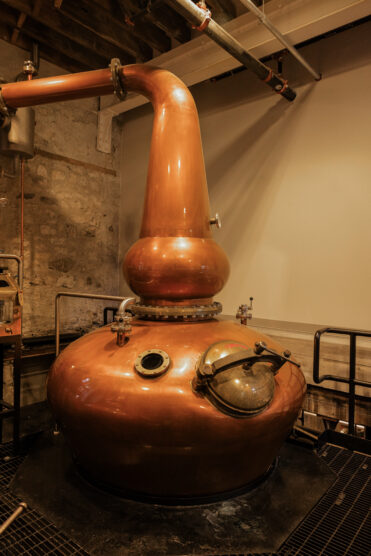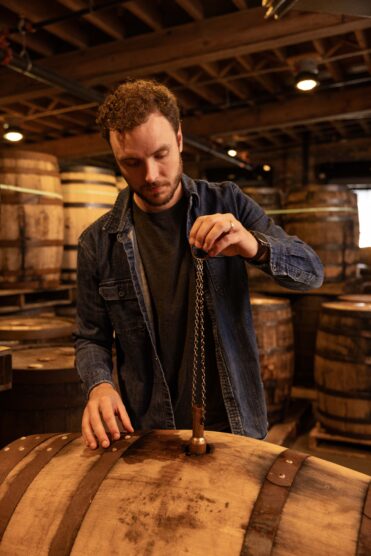The Sleeman Family Honours Its Spirited History at Spring Mill Distillery
Whisky business.

From left to right: Quinn, John, and Cooper Sleeman.
Standing in the Ward Bar, the tasting room at Spring Mill Distillery—the whisky-focused outfit in Guelph, Ontario—John, Cooper, and Quinn Sleeman don’t look like the descendants of a long line of rogues. In fact, upon first blush, John, the distillery’s well-spoken, blazer-wearing founder, CEO, and Cooper and Quinn’s father, looks and sounds more like a judge than a jailbird. A kingpin of a different sort, he has a knack for utilizing the lessons and recipes inherited from his forebears to develop wildly successful (and perfectly legal) brewing and distilling businesses.
In the 1600s and 1700s, the Sleeman family operated as privateers along the coast of Cornwall, England, before legitimizing their business by opening a brewery. So when John Sleeman’s great-great-grandfather immigrated to Canada in 1834, it was only logical that he put his expertise to good use by opening Stamford Spring Brewery near what is now St. Catherines, Ontario. After relocating to Guelph in 1847, Sleeman opened a new brewery in 1851—it remained open until a 1933 ruling by the Canadian government shut it down for not paying taxes on beer bootlegged to the United States during Prohibition. Family legend says the government also forbade any member of the Sleeman clan from brewing for the next 50 years.
Fifty years later, John’s aunt gave him historical recipes, and he immediately set to work resuscitating the family business, establishing Sleeman Breweries Ltd. in earnest in 1988. After nearly two decades of industry-disrupting success, he sold the company to Sapporo in 2006 and began thinking about his next project, one he envisioned as his legacy. Nearly 10 years on, while planning a new-build to house the then unnamed Spring Mill Distillery venture, Sleeman’s plans were shaken up when he heard about the discovery of another potential bootlegging project in Guelph—one significant enough for him to scrap the prospective building.

After a comprehensive year-long restoration and renovation project, the Sleemans spared no expense outfitting Spring Mill Distillery with state-of-the-art equipment.

Spring Mill Distillery’s current product lineup consists of whiskies, gin, vodka, liqueurs, and RTD cocktails.
“There was a document that landed on my dad’s desk in 2015 about some undiscovered or newly discovered distilling holding tanks, even possibly stills, that were in a false basement in downtown Guelph,” says Cooper, the older brother and Spring Mill’s sales and marketing manager, as he points to the floor of the Ward Bar below which the false basement lies. Between 1830 and 2010, Allan’s Mill operated as a flour mill, distillery, brewery, and wool-carding facility, among other things, and its palimpsestic patchwork buildings represent some of the most historically significant commercial spaces in the city. Among them was a building dating to 1835, a distillery rumoured to have produced the new-make whisky that was bootlegged to the United States in the same trucks as Sleeman beer during Prohibition. “Turns out the tanks are connected to our great-great-grandfather when he was mayor and smuggling with Al Capone. Dad goes, ‘Okay, we’re putting our distillery here.’”
After a comprehensive year-long restoration and renovation project, the Sleemans spared no expense outfitting the still-fledgling distillery with state-of-the-art equipment before it officially opened in 2019. For its single malt whisky, for example, they ordered custom-built wooden washbacks and copper pot stills from Scotland. Spring Mill has also shown an unparalleled commitment to aging its whisky in high-quality barrels, and unlike most Canadian distilleries, it has its own cooperage. Led by Quinn, who trained in Scotland and the U.S.A., the small cooperage produces new Canadian oak barrels for aging certain of its main whiskies as well as select private cask purchases.

Spring Mill’s current product lineup consists of four core whiskies, gin, vodka, liqueurs, RTD cocktails, and a rotating cast of extra-limited whiskies. Uniquely for a Canadian distillery, its hero product isn’t a rye or rye-style whisky but rather a bourbon style: its Traditional Straight Whisky. Made following all of bourbon’s legal requirements except the country of origin, the Traditional Straight Whisky became the distillery’s first offering due to the category’s broad palatability compared to rye or single malt whisky. “We decided our first liquids needed to be the kind that if you don’t like whisky, you’ll probably like this,” John says. The other standout, The Cooper’s Rye, a 100 per cent rye whisky aged entirely in Canadian oak barrels, is a welcome improvement on the classic Canadian spirit. Clocking in at 48 per cent ABV, and with a rich, cognac-like colour, it is a testament to the power of inherited knowledge.
Unlike many distilleries, Spring Mill has had significant success among women (an underrepresented but rapidly expanding demographic in the whisky world), who make up roughly 44 per cent of its consumer base for its Traditional Straight Whisky. Distribution is also beginning to expand across Canada, but its products aren’t yet available in any other countries. However, with the amount of success it has already experienced, expect to see Spring Mill Distillery’s products in other countries soon—duties paid.





